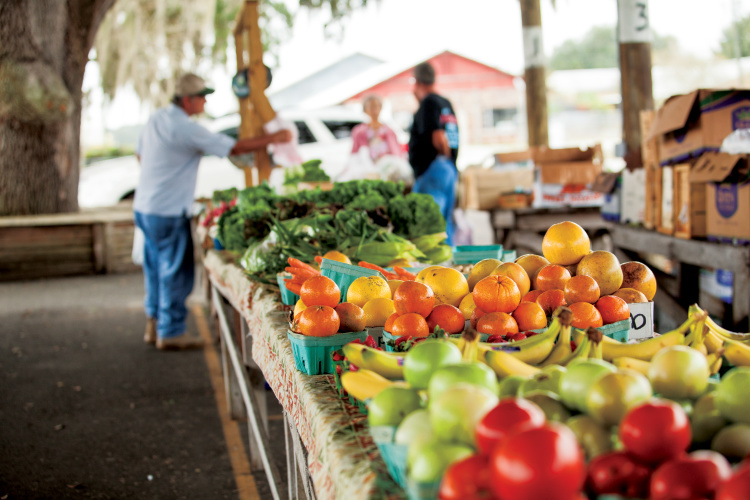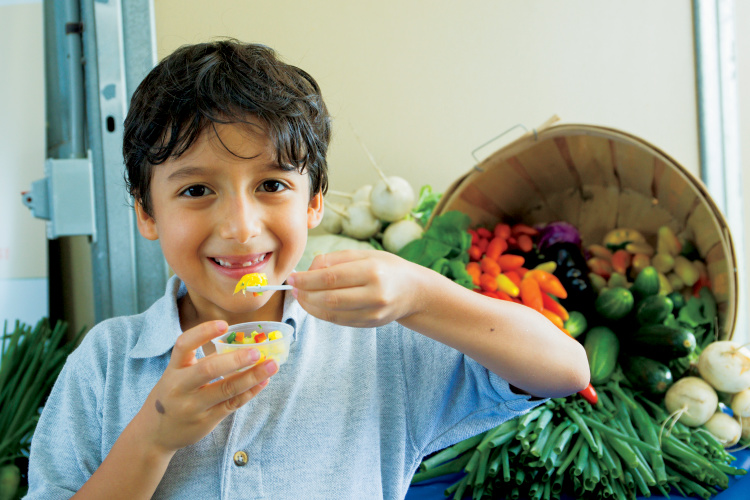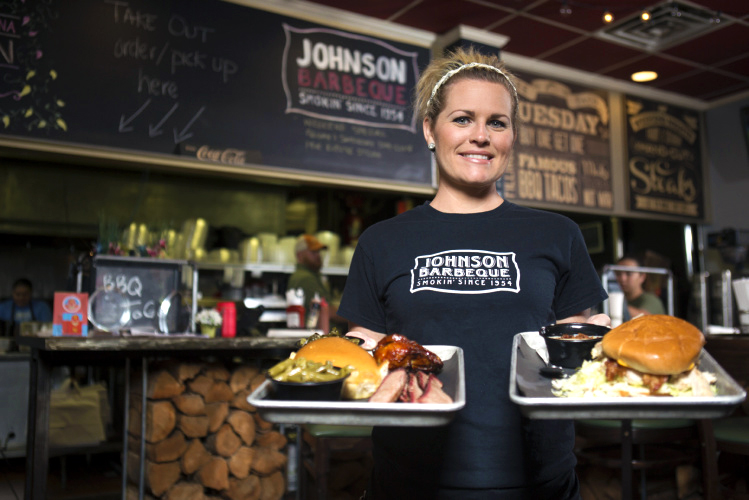Home > Florida > Florida Farm to Table > Farmers Markets are Vital to Florida Agriculture
Farmers Markets are Vital to Florida Agriculture
In partnership with: Florida Department of Agriculture and Consumer Services

With more than 47,000 farms and over 9 million acres of farmland, Florida helps feed the nation and the world. On any given day, somewhere in Florida a farmer is preparing a field, planting or tending a crop, or harvesting a yield.
But for most people, food simply comes from their local grocery store. Few give much thought to what it takes to bring this bounty from the field to the market and, ultimately, to their table.
Florida’s $120 billion agriculture industry depends on an efficient, fair and reliable system that links farmers to consumers. For over 80 years, this has been the role of Florida’s State Farmers Markets. The markets serve as a network bringing together packers, processors, suppliers, wholesalers, brokers, shippers and buyers.
Operated by the Florida Department of Agriculture and Consumer Services, State Farmers Markets provide producers across the state a marketing platform to conduct commerce, thus helping sustain thousands of jobs for local communities.
Some markets, like Florida City, operate year round, while others, like Palatka and Trenton, are more seasonal due to the nature of the crops produced. Almost all of the State Farmers Markets have some characteristics of the wholesale shipping point market. Some – like Suwannee Valley and Pompano – serve more as redistribution markets where prepackaged goods are brought in and sorted for shipping to supermarkets across the country.
All of the State Farmers Markets are self-sustaining, meaning that the revenue from tenant leases pays for the markets’ operation. The market tenants are involved in a variety of businesses ranging from restaurants serving meals prepared with local produce to retail stores selling agricultural equipment, clothing, seed and feed for livestock in support of local farmers.

Located near the Gulf Coast, the Fort Myers State Farmers Market leases warehouses where commercial fishermen unload their daily catch, while an adjacent seafood market cooks meals for the local community. Just next door, open-air retailers sell fresh fruit and vegetables grown in nearby farms. Consolidators in Plant City gather various produce from local farms to quickly fill orders from major grocery chains across the country. Markets in Florida City, Pompano and Quincy work with the nonprofit group FarmShare to deliver fresh produce to local food banks.
Operating since 1940, the Fort Pierce State Farmers Market is home to perhaps the most diverse collection of tenants. Mushrooms are grown in large, temperature-controlled rooms and later picked, packaged, refrigerated, and shipped to restaurants and grocery stores in South Florida.
Cucumbers are pickled in an adjacent production facility. Here, the small cucumbers move along conveyer belts to be cleaned, cut and diced. After soaking in a trade-secret juice, buckets of pickles are stored in giant onsite coolers until ready to be shipped. These pickles are distributed all across Florida, supplying hundreds of restaurants, grocery stores, the state’s largest theme park, and even cruise lines.
The warehouses at Fort Pierce all have freight accessibility, allowing tenants to ship products right from the loading docks. Fresh Co. Limited operates a bottling plant year round where various flavors of Indian River Select juices are filled at a rate of 120 bottles per minute. Onsite inspectors ensure that food safety regulations are met, allowing the popular juices to be shipped domestically and abroad.
The Pompano State Farmers Market is an example of a modern-day redistribution market. Conveniently located near I-95 and Florida’s Turnpike, the Pompano Market has always been ideal for shipping and distribution. Produce grown in the prolific agricultural regions of Central and South Florida is brought to the market, prepackaged, and ready to be shipped to supermarkets across the country.

Since opening its doors in 1939, Plant City has served as a place for farmers to sell agricultural commodities, such as livestock, fruit and vegetables, and equipment. While Plant City ships out its share of tomatoes, watermelons, bell peppers, squash, eggplant, and gourmet fruits, Florida strawberries continue to be its premier product. Local farmers still grow their berries in nearby fields, where they are picked, boxed and transported to the market where they are cooled and shipped at the peak of freshness. Plant City also includes onsite restaurants, Johnson Barbeque and Fred’s Market Restaurant. Fred’s is known for their fried chicken, and uses local products whenever possible including strawberries, a highlight of the season in Plant City.
A major State Farmers Market is Florida City. Operating year round, it handles thousands of pounds of fresh produce each day. Everything from yellow squash to wax beans are grown in the surrounding farmlands, harvested and delivered to the market to be processed.
Steeped in history and tradition, Florida’s State Farmers Markets have evolved with the times to better serve the needs of the agriculture industry and the tastes of the consuming public. It all started with an idea focused on creating jobs, growing an industry, and feeding people. After more than 80 years, Florida’s State Farmers Markets continue to meet and exceed those goals.



